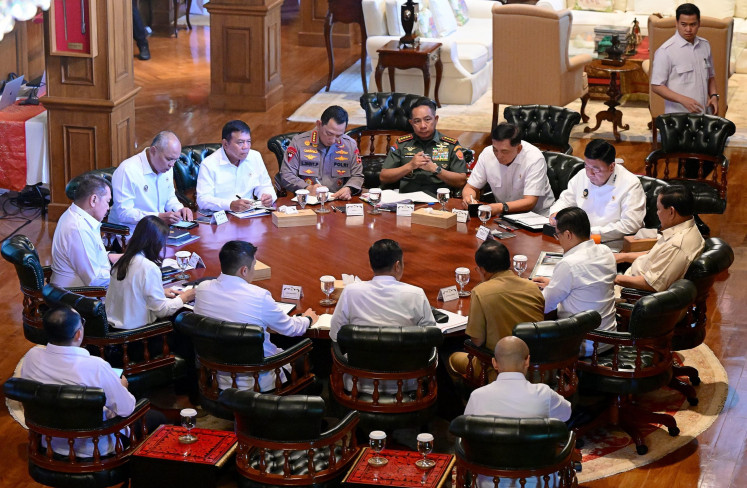Popular Reads
Top Results
Can't find what you're looking for?
View all search resultsPopular Reads
Top Results
Can't find what you're looking for?
View all search resultsAstra to expand distribution amid pressure on car sales
Diversified conglomerate Astra International Indonesia has allocated up to Rp 750 billion (US$611
Change text size
Gift Premium Articles
to Anyone
D
iversified conglomerate Astra International Indonesia has allocated up to Rp 750 billion (US$611.45 million) to set up 15 new dealers next year amid pressure on car sales from tightening competition and fuel-price hikes.
Strengthening sales distribution would be the company's strategy in maintaining its market share, which had been dropping with entries from new players in the country's four-wheeler market, Astra chief group treasury and investor relations Iwan Hadiantoro said.
Iwan said the conglomerate planned to establish 10 to 15 new outlets next year, with investments for a dealer estimated to hit Rp 50 billion each, meaning the company had to earmark up to Rp 750 billion to establish the distributors sites.
He said the company expected next year's sales to remain flat, in line with projection from the Association of the Indonesian Automotive Manufacturers (Gaikindo) that predicted national car sales to stay at 1.25 million units next year, similar to this year.
Further, he added that Astra had to also face challenges from tightening competition, which had pulled down the country's largest car maker and distributor's market share. The company's market share suffered a decline from 60 percent at the start of 2012 to 51 percent to date.
As of October, Astra car sales slumped by 2.86 percent year-on-year to 525,976 units, amid challenges from competitors and a 'discount war' that has negatively impacted Astra performance.
'Indonesia is a really interesting market, many players are interested in getting their feet in the country. While of course boosting our market share will be our top priority, retaining our market share at around 50 percent of the country's total market next year will be good enough,' Iwan said.
Astra's documentation estimated that car sales penetration in Indonesia is around 5 percent of the country's population.
Astra is also impacted by slowing car demand amid macroeconomic slowdown, which is expected to continue next year following the newly elected President Joko 'Jokowi' Widodo's decision to increase subsidized fuel price by Rp 2,000 a liter and the central bank's move to raise benchmark interest rates to curb inflation following the fuel-price hike.
'We've synergized our business. We're not only an automotive seller but also a good component maker. In facing such challenges, we will increase our manufacturing capacity and enlarge our distribution network.'
From January to October, car sales, a key indicator of consumption in the economy, rose slightly by 1.96 percent to 1.04 million units this year, according to data from Gaikindo.
Gaikindo chairman Sudirman M. Rusdi previously said that rising fuel prices typically slows down car sales for three months, with a 10 to 15 percent decline each month. He was confident the market would manage to adjust afterward.
Fitch Ratings expected the reduction in auto sales to have only a short-term impact, but will be more severe than the 2013 subsidized fuel price hike because of slower economic growth. Indonesia's economic growth slowed to 5.01 percent in the third quarter, the weakest pace since 2009.
In 2013 car sales grew 7 percent a year after the subsidized fuel price increase, compared with 2005 when sales slumped 43 percent as the government raised fuel prices by 88 percent, Fitch noted.
While automotive remains Astra's backbone, contributing 40.8 percent to its annual bottom line as of September, its income alone dropped by 14 percent year-on-year.
Iwan said that the company's capital expenditure (capex) next year would be similar with this year's capex.
The company had initially planned to spend about Rp 16 trillion for its capex this year. As of September, however, the company used only Rp 9.6 trillion of its capex; 24 percent of which went to its automotive section, 23 percent to its agribusiness unit, while the remainder goes to its other business.
Iwan estimated that the company would spend around Rp 12 trillion for capex by year-end.










